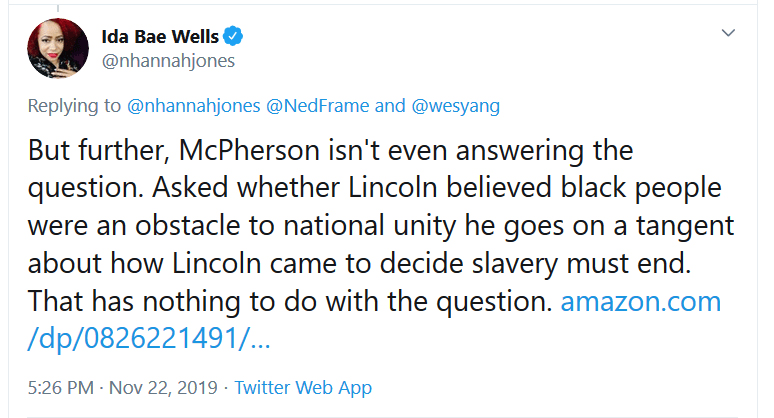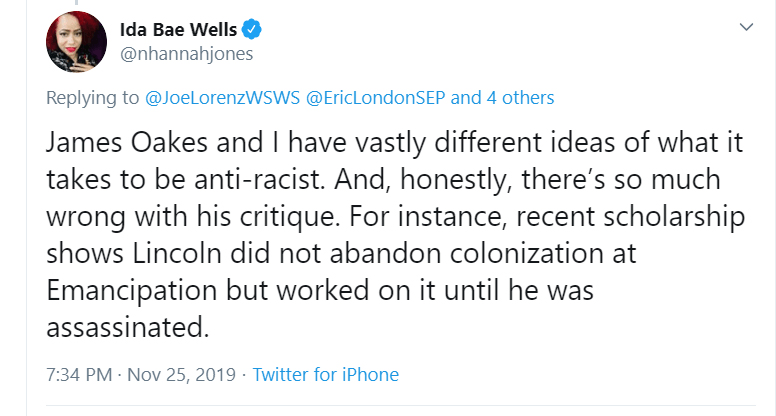 Phillip W. Magness – December 11, 2021 @ America Institute for Economic Research
Phillip W. Magness – December 11, 2021 @ America Institute for Economic Research
When Nikole Hannah-Jones published the 1619 Project in August 2019, it initially came under an unfair line of attack from historians who took issue with aspects of its discussion of Abraham Lincoln. Hannah-Jones had correctly identified Lincoln as a supporter of black colonization – a common 19th century “solution” to slavery that involved coupling emancipation with the resettlement of the freedmen abroad in locations such as Liberia or Central America.
Lincoln’s speeches and writings contain dozens of unambiguous endorsements of colonization, which he intended to subsidize through the US government, albeit on a voluntary basis for the freedmen colonists. Though misguided in its aims, Lincoln’s brand of colonization was also motivated by his antislavery beliefs and specifically the notion that resettlement abroad would permit African-Americans an opportunity to enjoy the rights and freedoms that were denied to them in the United States. Nonetheless, Lincoln’s colonizationism has long been a sore spot for Lincoln scholars due to the complexities it introduces to the “Great Emancipator” political iconography. Several generations of historians have put their pens to work seeking a way to give Honest Abe an out where colonization is concerned. Most contend that Lincoln abandoned the scheme mid-presidency, reading an active repudiation into his public silence on the measure in the final year of the Civil War. Others even put forth the theory that Lincoln only advocated colonization as a political ruse – a “lullaby” to coax public opinion closer to the Emancipation Proclamation.
Reality is much more straightforward. In addition to being a sincere antislavery man, Lincoln was also a sincere colonizationist who meant what he said when he espoused this position. A substantial body of my own work on the Civil War era investigates this exact question, conclusively showing that Lincoln continued to pursue colonization schemes through diplomatic channels well beyond the Emancipation Proclamation, and likely into the last months of his presidency. When Nikole Hannah-Jones made similar claims in 2019, she was drawing directly on my work as a historian of that subject.
In fact, Hannah-Jones stated as much in a series of now-deleted comments as some of the other historian-critics questioned her claims about Lincoln and colonization.
On November 22, 2019 she tweeted out a link to my co-authored 2011 book on the subject, Colonization After Emancipation: Lincoln and the Movement for Black Resettlement.
Three days later, Hannah-Jones wrote, “For instance, recent scholarship shows Lincoln did not abandon colonization at Emancipation but worked on it until he was assassinated.” In another comment, she criticized historian James McPherson’s “dated scholarship on Lincoln ending his efforts to colonize black people at Emancipation” (McPherson is one of the main proponents of the above-mentioned “lullaby” thesis). Quite the contrary, Hannah-Jones continued, “recent scholarship shows [Lincoln] continued these efforts until his death.”
In both cases, the “recent scholarship” that she referred to was my own work, which I summarized in a series of articles in 2012 and 2013 for Hannah-Jones’s own employer, the New York Times.


There were certain interpretive differences between my work and the 1619 Project on this point – for example, Hannah-Jones understated the extent to which antislavery motives shaped Lincoln’s support for the measure, which he saw as a pathway to wean the country away from the brutal plantation system. But the historical evidence of Lincoln’s deep connections to colonization was clear, and at least on that point the 1619 Project got it right.
That is, until Hannah-Jones realized that the historian she was citing was also an outspoken critic of other aspects of the 1619 Project.
“What are the credentials, exactly of Phil Magness?” Hannah-Jones fumed in another now-deleted comment after she realized that I had offered a less-than-favorable assessment of her project’s other historical claims, and particularly its error-riddled essay on the economics of slavery by Matthew Desmond. Her fury intensified in January 2020 after Alex Lichtenstein published a lengthy defense of the 1619 Project against his historian critics, attempting to invoke his authority as the editor of the American Historical Review to arbitrate the disputes over its claims about slavery in the Revolutionary through Civil War eras. At the time I pointed out that Lichtenstein – a 20th century historian – was not an expert in the antebellum United States, and was thus not qualified to assume the role of historical judge and jury on specialist claims about that era. Hannah-Jones snapped back, “Lol. You aren’t a specialist in that era either yet that didn’t stop you.”
Setting aside the fact that only a few weeks prior Hannah-Jones herself had been explicitly touting my work on Lincoln’s colonization projects to justify her own claims in the 1619 Project, I’ll simply note that I’ve authored over two dozen scholarly works on slavery and the Civil War era. This includes my aforementioned book, the chapter on colonization in the Essential Civil War Curriculum, as well as multiple peer-reviewed articles on slavery in the U.S. and broader Atlantic world. Hannah-Jones, by contrast, has no known original scholarship to her name of any kind on slavery or this period of American history.
At first, I chalked this bizarre exchange up to Hannah-Jones’s increasingly unprofessional approach to defending the 1619 Project. Instead of responding to substantive and factual critiques of her work, Hannah-Jones began directing personal abuse and insults at her critics.
When James McPherson offered his own less-than-flattering take on Hannah-Jones’s work in November 2019, she responded dismissively: “Who considers him preeminent? I don’t.” McPherson is a Pulitzer Prize-winning historian of the Civil War, and author of what is widely considered the standard single-volume treatment of the subject, Battle Cry of Freedom. In December 2019, McPherson joined distinguished scholars Gordon Wood, Sean Wilentz, Victoria Bynum, and James Oakes in questioning Hannah-Jones’s attempts to recast the American Revolution as a fight to preserve slavery. Rather than answer them, she dismissed the group as a whole by labeling them “white historians.”
Hannah-Jones saved her most brazenly abusive attacks though for African-American critics of the 1619 Project, such as Columbia University professor John McWhorter and journalist Coleman Hughes. When McWhorter, Hughes, and other African-American scholars launched a competitor 1776 Project in February 2020 through the Robert Woodson Center, Hannah-Jones lashed out on Twitter by posting photos of herself making derogatory gestures at her black interlocutors. Although she later deleted the tweets at the apparent request of her employer, Hannah-Jones made Hughes in particular a focus of her continued verbal abuse. “That Ivy League education certainly didn’t do you any favors,” she wrote in another comment to Hughes in August 2020. “Next time screenshot me and don’t quote text me because I’d rather not read your drivel. I tried to find something to quote tweet in that profoundly mediocre 1776 Project essay you wrote, but alas, nothing was worthy.”
It comes with little surprise, then, that my own experiences with Hannah-Jones followed a similar course after she realized that I was the author of the works on black colonization that she had previously been citing. Rather than engage with the evidence surrounding the disputed claims of her work, Hannah-Jones’s first impulse is to insult, attack, and dismiss the critic as “unqualified” to evaluate her work. Only historians that she cherry-picks to affirm her preconceived position, such as the University of South Carolina’s Woody Holton, are permitted under her credential-touting games.
Except in the case of Lincoln and colonization, Hannah-Jones even went so far as to modify her previous historical claims in order to avoid having to cite and credit a 1619 Project critic. As a result, I have the unusual distinction of having fallen from Hannah-Jones’ grace after she previously invoked my scholarship to support her work back in 2019. When an extended version of the 1619 Project came out in book form in November 2021, Hannah-Jones had not only excised substantial portions of her previous arguments about Lincoln – she cast about and found a new source to justify her revised interpretation on Lincoln.
The 1619 Project book now states only that Lincoln supported “colonization schemes as late as 1862,” and further implies that Lincoln abandoned the program after he issued the Emancipation Proclamation on January 1, 1863. Hannah-Jones’s new source for this revised claim appeared in footnote 38 of her essay: a 2016 popular press book entitled Stamped From the Beginning by Critical Race Theory activist Ibram X. Kendi.
Hannah-Jones’s new version of Lincoln’s colonization initiative is unambiguously wrong as a matter of history. One of the many discoveries I made while researching this subject was a colonization agreement that Lincoln signed on June 15, 1863 with the colonial government of British Honduras, or modern-day Belize. This document resides in the National Archives of Belize where I discovered it in 2011, and was previously unknown to any historian.
But as a broader matter of principle, Hannah-Jones’s behavior illustrates the absence of basic scholarly integrity from her approach to writing history. Rather than following the evidence where it leads, Hannah-Jones picks and chooses bits and pieces of her arguments from a secondary literature based on whether it conforms to her preconceived political narrative. She approaches citations as a tool by which she can reward other scholars who affirm that narrative. And if a previously-cited scholar runs afoul of Hannah-Jones, she is perfectly willing to alter the “history” presented in the 1619 Project in ways that excise the offending work and replace it with a completely different narrative – provided that its author flatters Hannah-Jones’s own personal politics and ambitions in the process.
Phillip W. Magness

Phillip W. Magness is Senior Research Faculty and Interim Research and Education Director at the American Institute for Economic Research. He holds a PhD and MPP from George Mason University’s School of Public Policy, and a BA from the University of St. Thomas (Houston).
Prior to joining AIER, Dr. Magness spent over a decade teaching public policy, economics, and international trade at institutions including American University, George Mason University, and Berry College.
Magness’s work encompasses the economic history of the United States and Atlantic world, with specializations in the economic dimensions of slavery and racial discrimination, the history of taxation, and measurements of economic inequality over time. He also maintains active research interest in higher education policy and the history of economic thought. In addition to his scholarship, Magness’s popular writings have appeared in numerous venues including the Wall Street Journal, the New York Times, Newsweek, Politico, Reason, National Review, and the Chronicle of Higher Education.

No comments:
Post a Comment